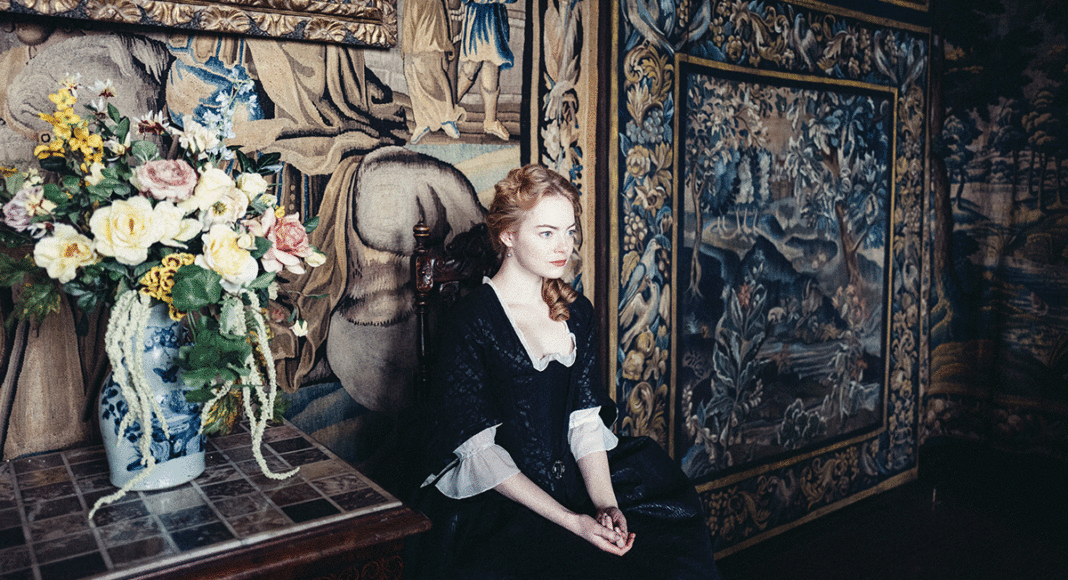The work of filmmaker Yorgos Lanthimos is an acquired taste, like pig’s feet or blood pudding. It appeals to those with an appetite for caustic low comedy, sexual intemperance, and human venality, all whipped into a heavy bouillabaisse and set to full boil. His peculiar sensibility seems to resonate with a lot of viewers, especially critics, since his breakout movie, the alternative-reality satire The Lobster, in 2015. Now he applies his worldview to the 18th century in the period piece The Favourite, with decidedly mixed results.
The movie has a nodding acquaintance with historical reality. The story is set in the time of England’s Queen Anne, in the first decade of the 1700s, and concerns her relationships with her close friend and confidante, Lady Sarah Churchill (ancestor of you-know-who) and the genteel servant Abigail. All are historical personages, and Lanthimos and scriptwriters Deborah Davis and Tony McNamara should be commended for combing through history to find a tale featuring three juicy parts for actresses in a story about women jockeying for position in a man’s world.
Queen Anne (a terrific Olivia Colman) is portrayed as imperious and quicksilver in her temperament, yet timorous about her ability to actually lead. She’s kept on track by the politically astute Lady Sarah (Rachel Weisz), whose war hero husband, the Duke of Marlborough, is off fighting the French. The women have been besties since girlhood.
Enter Abigail (Emma Stone) a distant relation of Sarah’s hoping to find employment at court. Once a lady but fallen on hard times, she’s ambitious to regain her station and follows Sarah’s example in everything—particularly her attention to the queen. When she spies an intimacy beyond mere friendship between Anne and Lady Sarah, Abigail sees her way forward.
This Abigail is an All About Eve-style opportunist, ruthlessly pursuing her own agenda beneath an innocent exterior. However, the simmering stew of erotic sexual politics between the three women (and the occasional man onscreen long enough to register, like Nicholas Hoult as foppish, insinuating opposition party leader Harley) has its basis in speculation at the time over Anne’s sexuality that continues today.
Lanthimos often flings history aside, sometimes in entertaining ways, like the palace ball scenes where deadpan, extravagantly costumed dancers dip, flip and haul each other around in moves better suited to an ice-skating arena or hip-hop stage. There are other moments of unexpected tenderness in this witches’ brew of intrigue, as when Anne introduces Abigail to her 17 pet rabbits—each one named for one of the children Anne has borne and lost.
This tragic part of Anne’s history is true (well, I’m not sure about the rabbits). But the narrative often goes awry, if not historically, in terms of its weirdly comic tone. With her husband off at the front and her hands full of delicate diplomacy, when does Lady Sarah find the time to go shooting birds with Abigail? Yes, it’s metaphor, with Sarah losing her mentor status as Abigail’s aim grows more precise, but two such comparative scenes (instead of four) would get the point across.
The point of other sequences is more obscure, like the lords’ mania for duck racing. Or a giggling, middle-aged aristo, naked under an enormous wig, shown dodging missives flung by a bunch of cackling nobles. On the night of her wedding to a smitten young lord, a scowling bride is too busy scheming to offer her new husband anything more than indifferent hand service.
Lanthimos may be taking aim at human folly—greed, ambition, depravity, especially among the oh-so-idle rich—but that’s a broad target. He coaxes excellent performances out of all three of his lead actresses, Colman in particular as the cranky, unhappy, insecure queen. But as the fortunes of these women rise and fall, and viewer sympathies are meant to keep shifting, the characters as written never achieve the resonance that would keep viewers engaged and invested in them. They remain pawns in an exercise of mannered absurdity.
THE FAVOURITE
** (out of four)
With Emma Stone, Rachel Weisz, and Olivia Colman. Written by Deborah Davis and Tony McNamara. Directed by Yorgos Lanthimos. A Fox Searchlight release. Rated R. 131 minutes.















Good review by Lisa Jensen offering a bit of sanity on RottenTomatoes amidst all the critics who are drooling on themselves while praising this forgettable, desperate-to-be-edgy silly film. Nothing in this movie, except the sets, deserves the lavish praise and awards buzz that it’s getting.